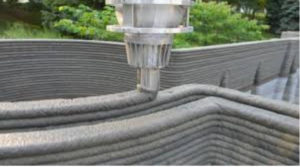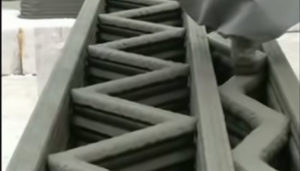Smaller of the two expected to arrive this summer and experiments with it to begin at Chino Valley Center
 Recall that the Yavapai Community College District Governing Board has authorized the College to spend a half million dollars to purchase futuristic 3d construction machinery. (See earlier videos and stories on the Blog about how these printers work.) The authorization was for two printers, according to officials interviewed at the Tuesday Governing Board meeting, not one.
Recall that the Yavapai Community College District Governing Board has authorized the College to spend a half million dollars to purchase futuristic 3d construction machinery. (See earlier videos and stories on the Blog about how these printers work.) The authorization was for two printers, according to officials interviewed at the Tuesday Governing Board meeting, not one.
The first printer is considered “small” and experiments with how it operates are anticipated to begin this summer at the Chino Valley Center. The larger 3d cement printer will arrive later in the year.
The first experiment will have the 3-d cement printer used to build a small manufactured home replacing one now owned by the College that is need of repair.
It appears that the initial courses on how to operate the machine will be offered at the Career and Technical Education Center that is adjacent the Prescott airport. At some point, the machines can be used to develop courses for operating them on the Verde Campus.
With these futuristic machines and curriculum, the College hopes to attract a new group of students for its construction program. It has a long-term desire to partner with a builder.
 Architect Tom Riley explained to the Governing Board at its February meeting how the newly authorized half million dollars in Yavapai Community College 3d construction printing equipment can be used. He has offered to draw the first plans for a small building at the Chino Valley Center that will be using the equipment.
Architect Tom Riley explained to the Governing Board at its February meeting how the newly authorized half million dollars in Yavapai Community College 3d construction printing equipment can be used. He has offered to draw the first plans for a small building at the Chino Valley Center that will be using the equipment.  Yavapai Community College announced January 31, 2020 that it will launch the Nation’s First 3D construction program. The program is a modification to the College’s current Construction programs and features emerging technology of 3D printing to construct houses.
Yavapai Community College announced January 31, 2020 that it will launch the Nation’s First 3D construction program. The program is a modification to the College’s current Construction programs and features emerging technology of 3D printing to construct houses. The Coconino Community College’s construction technology management program received a $1 million grant last week from the Dell E. Webb Foundation. The funds will be used to renovate the current Construction Technology Management facility at its Flagstaff Campus. It will also be used to expand existing CTM classes and in-demand programs such as heating, ventilation and air-conditioning and refrigeration or HVACR technology.
The Coconino Community College’s construction technology management program received a $1 million grant last week from the Dell E. Webb Foundation. The funds will be used to renovate the current Construction Technology Management facility at its Flagstaff Campus. It will also be used to expand existing CTM classes and in-demand programs such as heating, ventilation and air-conditioning and refrigeration or HVACR technology. Poor building “L.” Has it become the Rodney Dangerfield of Yavapai Community College? Rodney once joked: “I get no respect at all – When I was a kid, I lost my parents at the beach. I asked a lifeguard to help me find them. He said, `I don’t know kid, there are so many places they could hide'”.
Poor building “L.” Has it become the Rodney Dangerfield of Yavapai Community College? Rodney once joked: “I get no respect at all – When I was a kid, I lost my parents at the beach. I asked a lifeguard to help me find them. He said, `I don’t know kid, there are so many places they could hide'”.  Camp Verde citizen Carol German pleaded with the Yavapai Community College Governing Board at its October meeting to use some of the $22 million in tax dollars paid every year by Verde Valley residents in property taxes to build a centralized Career and Technical Education Center over here. Ms. German said that she appreciated the efforts made so far in the Valley by the College in its fledgling CTE effort but “they needed to be expanded.”
Camp Verde citizen Carol German pleaded with the Yavapai Community College Governing Board at its October meeting to use some of the $22 million in tax dollars paid every year by Verde Valley residents in property taxes to build a centralized Career and Technical Education Center over here. Ms. German said that she appreciated the efforts made so far in the Valley by the College in its fledgling CTE effort but “they needed to be expanded.”
